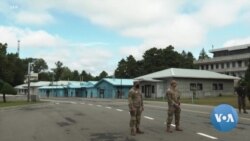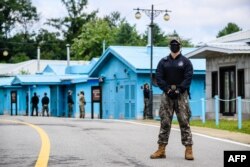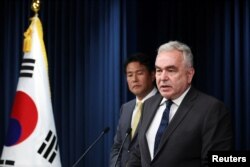An American soldier facing disciplinary action by the U.S. military is believed to be in North Korean custody after illegally crossing the border dividing the two Koreas at the Joint Security Area, or JSA, on Tuesday.
“What we do know is that one of our service members who was on a tour, willfully and without authorization, crossed the Military Demarcation Line, or MDL. We believe he is in DPRK custody,” U.S. Defense Secretary Lloyd Austin said in a briefing on Tuesday.
“And so, we are closely monitoring and investigating the situation and working to notify the soldier's next of kin,” he said. “I’m absolutely foremost concerned about the welfare of our troops. And so, we will remain focused on this.”
The soldier, who the Army identified at Private Second Class Travis T. King, had been in a detention facility for about a month and a half for disciplinary measures, a U.S. official told VOA, adding that he was taken to the airport to return to the U.S. but never got on the plane.
Another official told VOA that the soldier was supposed to be heading to the U.S. for pending administrative separation from the U.S. military.
Officials say the soldier joined a tour of the Korean border village of Panmunjom, where he fled across the border.
The United Nations Command, a multinational military force stationed at the border village to maintain the pause to the Korean War, said it is working with North Korea’s military to “resolve the incident.
The soldier in question suddenly crossed north of the military demarcation line, the official border, at around 3:27 p.m. local time on Tuesday afternoon, according to South Korean daily The Chosun Ilbo, citing unnamed sources.
No fire appeared to have been exchanged at the high-tension border town, where soldiers from the two Koreas stand guard around the clock, facing each other.
The incident occurred as South Korea’s military remains on high alert for possible provocations from North Korea after a U.S. nuclear ballistic missile submarine arrived in port in the southern city of Busan on the same day.
Arrival of the USS Kentucky, capable of launching Trident II ballistic missiles with a range of 12,000 kilometers, is a highly symbolic move that Washington will stand with South Korea in the event of a North Korean nuclear attack.
It is the first visit of a U.S. nuclear submarine in decades, said the White House Indo-Pacific coordinator, Kurt Campbell, during a press conference in Seoul Tuesday.
Campbell is leading a 30-person delegation to officially launch the Nuclear Consultative Group, or NCG, with Seoul. South Korea says the initiative will strengthen their alliance to one that is nuclear based. It is the realization of a commitment made by U.S. President Joe Biden and South Korean President Yoon Suk Yeol in April, as outlined in the Washington Declaration.
A joint statement following the inaugural meeting of the NCG noted that any North Korean nuclear attack against the United States or its allies would “result in the end of that regime,” and that a nuclear attack against South Korea would “be met with a swift, overwhelming and decisive response.”
VOA’s Korean Service contributed to this report.







